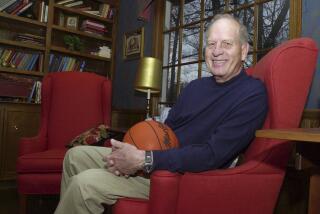Basketball Coaching Great Frank McGuire Dies at 80
- Share via
Frank McGuire, the New York City coach whose “underground railroad” of New York recruits was a cornerstone of college basketball’s rise in the South, died at his home in Columbia, S.C., Tuesday after a long illness. He was 80.
Complications from a 1992 stroke had added to McGuire’s declining health, the same year he suffered a broken hip in a fall. He received a pacemaker for an irregular heartbeat in late 1991, more than a decade after retiring from 45 years of coaching high school, service, college and professional basketball. His wife and other family members were at his side when he died.
In on his sport’s ground floor from the time he played in the inaugural Madison Square Garden game in 1934, McGuire coached St. John’s, his alma mater, to the 1952 NCAA championship final (an 80-63 loss to Kansas), coached North Carolina to the NCAA title in 1957 and, after a single season coaching in the NBA in 1962, went about building South Carolina from the ground up, into a perennial NCAA tournament team in the 1970s.
He coached or tutored a virtual Who’s Who of basketball names--Wilt Chamberlain, Dean Smith, Al McGuire, Lou Carnesecca, Billy Cunningham, Doug Moe, Bobby Cremins and Larry Brown among them. As St. John’s basketball/baseball coach in the early 1950s, McGuire even coached a third baseman named Mario Cuomo.
McGuire coached in the two most remembered games of Chamberlain’s historic career: Against Chamberlain in the 1957 NCAA championship game, when McGuire’s North Carolina team defeated Chamberlain and his Kansas teammates in triple overtime, 54-53; and for Chamberlain’s Philadelphia Warrior team on March 2, 1962, in Hershey, Pa., when Chamberlain scored his record 100 points against the Knicks.
It was the 1957 North Carolina team that went undefeated in 32 games, featuring only New Yorkers in the starting lineup: Lennie Rosenbluth, Pete Brennan, Joe Quigg, Tommy Kearns and Bobby Cunningham.
“New York is my personal territory,” McGuire declared at the time. “Duke can scout in Philadelphia, and North Carolina State can have the whole country, but if anybody wants to move into New York, they need a passport from me.”
McGuire needed no papers to prove his New York roots. A dapper dresser with wavy red hair, he carried his native Greenwich Village accent with him. He was one of 13 children, born Nov. 8, 1913, the son of a New York policeman. He learned his basketball playing for one of the settlement house teams organized for poor kids during the Depression, coached by a cartoonist named Ted Carroll.
Like a character out of an old movie, McGuire lived by simple tenets in a simpler time. He believed in promptness and directness and, for years, his college practice sessions basically were nothing more than scrimmages, without many drills or exercises.
Yet, as recently as 1985, when Tulane temporarily shut down its basketball program in the wake of a game-fixing scandal tied to players’ drug involvement, McGuire--already retired--declared that, if he were a young coach, he would “take every course on drugs I could find.”
“Smart, good ball-handling, typical New York style,” is how Carnesecca, the recently retired Hall of Fame coach from St. John’s, described the typical McGuire team. “And, he was a player’s coach.”
Said Brown recently: “He was the greatest game coach I’ve ever seen in my life. He was brutal to me, verbally (critical of mistakes), yet he was always there for me.”
Former New York Met pitcher Ed Lynch, named general manager of the Chicago Cubs on Monday, remembered that McGuire allowed Lynch to keep his basketball scholarship at South Carolina even after he stuck to baseball at the school.
As a player for St. John’s, McGuire participated in the first of Ned Irish’s successful series of college basketball doubleheaders at Madison Square Garden.
On Dec. 27, 1934, St. John’s opened against Westminster, followed by an NYU-Notre Dame game. After graduation, McGuire served in the Navy, based most of the time in Chapel Hill, N.C., home of the University of North Carolina, which would woo McGuire away from St. John’s in 1953.
Between 1948 and ‘53, he coached St. John’s to 20-victory seasons three times and was 102-36. But the basketball game-fixing scandals had rocked New York college basketball, and Carnesecca believed that McGuire left New York for North Carolina partly out of concern for his son, Frank Jr., who had been born with cerebral palsy.
“I believe he thought Frank Jr. could be taken care of better down there,” Carnesecca said. “They had better facilities. But Frank never forgot he was a New Yorker; he never forget where he came from.”
McGuire’s New York ties, in fact, allowed him to stock his North Carolina teams with New York talent that, frankly, was more open to playing college ball away from the city because of the scandals.
“You never recruited against him,” Carnesecca said. “You’d say, ‘Let’s take a different route’ if he went after a player.”
North Carolina wanted McGuire as a weapon to offset Everett Case’s progress in forming a basketball power at rival North Carolina State, and McGuire obliged with a 164-58 record. It was McGuire who hired Dean Smith as an assistant.
McGuire then tried the NBA for a season, obliging Chamberlain’s wish to play “all the time” by literally keeping Chamberlain in every minute of every game in 1962, when Chamberlain averaged a record 50.4 points a game.
Then, after two years of work in public relations, McGuire returned to coaching at South Carolina in 1964, where he resumed his “underground railroad” to New York players and had six 20-victory seasons in 17 years.
It was during his stay at South Carolina that McGuire’s first wife, Patricia, died of cancer in 1967. He remarried in 1973 and is survived by his wife, Jane, and two daughters.
Few of McGuire’s mementos remain. In 1987, fire destroyed his home, and the only surviving basketball relic was a Sports Illustrated cover photo of McGuire and Chamberlain, taken in 1962.
Frank McGuire at a Glance
The career of Frank McGuire, who died Tuesday:
* Overall college record 549-236, including 102-36 at St. John’s and 164-58 at North Carolina.
* Led St. John’s to NCAA title game in 1952 and North Carolina to the NCAA championship in 1957.
* Coached NBA Philadelphia Warriors in 1961.
* Coached South Carolina for 16 seasons, 1965-80.
* Most wins in South Carolina history. Had 283-142 record and took the Gamecocks to their first four NCAA tournament appearances in 1971-74.
* Named to the National Basketball Hall of Fame in 1977.
More to Read
Go beyond the scoreboard
Get the latest on L.A.'s teams in the daily Sports Report newsletter.
You may occasionally receive promotional content from the Los Angeles Times.










